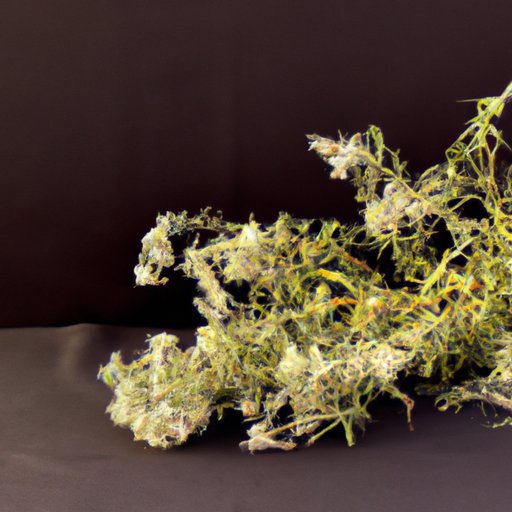
I. Introduction
Curious about the recent trend of smoking Mugwort? Wondering if it’s safe and whether it offers any health benefits? Look no further! This article explores the traditional use of Mugwort, its modern interpretation, its medicinal properties, and its potential risks. We will also discuss whether smoking Mugwort can help improve your relaxation and sleep, as well as its history, cultural significance, and alternatives to traditional smoking methods. Read on for a comprehensive guide on Mugwort as a smoking herb.
A. Explanation of What Mugwort is
Mugwort is a perennial plant that belongs to the Artemisia family and has been used for centuries in traditional medicine. Native to Asia, Europe, and North America, Mugwort is known for its anti-inflammatory, anti-fungal, and antioxidant properties. The plant’s leaves and stems have a distinct aroma and are often used to brew teas and tinctures or burned as incense to aid with relaxation and sleep. In recent years, smoking Mugwort has gained popularity due to its potential calming effects.
B. The Rise of Smoking Mugwort in Recent Years
The use of Mugwort for smoking purposes has increased in recent years, thanks in part to wellness enthusiasts and alternative medicine advocates who promote the herb’s potential benefits. Smoking Mugwort is also becoming more popular among those who are looking for natural alternatives to smoking tobacco and other substances. However, it’s important to understand the traditional uses of Mugwort and the scientific evidence behind the herb’s medicinal properties before trying it.
II. Mugwort Smoking: Traditional Use and Modern Interpretation
A. The Traditional Uses of Mugwort
Mugwort has been used for centuries in various traditional medicine practices. In Chinese medicine, Mugwort is used for its warming and energizing properties and to relieve digestive issues, colds, and menstrual cramps. In traditional Japanese medicine, Mugwort is believed to increase circulation and improve body temperature, and it is used in moxibustion therapy to stimulate acupuncture points. In European folk medicine, Mugwort is used to aid with digestion, anxiety, and insomnia. In all of these traditional practices, Mugwort is primarily used as an herb to be consumed orally or burned as incense.
B. Modern Interpretation of Smoking Mugwort
While Mugwort has traditionally been consumed orally or burned as incense, its modern interpretation includes smoking it for its potential health benefits. Smoking Mugwort involves rolling the dried Mugwort leaves into cigarette-sized rolls, which are then lit and smoked. Many proponents of smoking Mugwort claim that it can help with relaxation and sleep and that it produces a mild euphoria that is similar to smoking marijuana. However, there is limited scientific evidence to support these claims.
C. Preparing Mugwort for Smoking
To prepare Mugwort for smoking, you’ll need to start with dried Mugwort leaves. You can either purchase dried Mugwort leaves online or dry them yourself by hanging the leaves upside down in a dark, well-ventilated area until they are completely dry. Once the leaves are dry, you can grind them with a mortar and pestle or coffee grinder to make them easier to roll. Then, roll the Mugwort leaves into cigarette-sized rolls using rolling papers or tobacco wraps. Sit back, light up, and inhale the Mugwort smoke.
III. Exploring the Medicinal Properties and Risks of Smoking Mugwort
A. The Chemical Composition of Mugwort
Mugwort contains several chemical compounds, including thujone, camphor, and cineole, which are responsible for its unique aroma and potential health benefits. Thujone, in particular, is believed to have antispasmodic, digestive, and sedative effects.
B. Health Benefits Associated with Smoking Mugwort
Proponents of smoking Mugwort claim that it can help with relaxation, anxiety, and insomnia, and that it produces a mild euphoria. Some also believe that Mugwort can help stimulate lucid dreams and enhance dream recall, making it a popular herb among those who practice lucid dreaming. However, most of these claims are not backed by scientific evidence.
C. Risks and Potential Side Effects of Smoking Mugwort
While Mugwort is generally considered safe when consumed in moderation, smoking Mugwort can lead to potential health risks and side effects. Mugwort smoke may irritate the lungs, throat, and eyes, and some people may experience an allergic reaction to Mugwort if they have a known allergy to other plants in the Artemisia family. Additionally, Mugwort contains thujone, which can be toxic in high doses. Pregnant women should avoid Mugwort as it can stimulate menstruation and potentially induce abortion.
IV. Can Smoking Mugwort Help You Relax and Sleep Better? A Comprehensive Guide
A. How Mugwort Can Help with Relaxation and Sleep
Historically, Mugwort has been used for its calming and sedative properties. In traditional Chinese medicine, Mugwort is believed to improve the flow of Qi (life force energy) and blood, which helps to calm the nervous system and improve sleep. Similarly, in traditional Japanese medicine, Mugwort is believed to boost the immune system and promote relaxation. When smoked, some individuals may feel a sense of relaxation and calmness.
B. The Science Behind the Calming Effects of Mugwort
There is limited scientific evidence to support the calming effects of smoking Mugwort, but some studies suggest that Mugwort extract may help improve sleep quality, reduce anxiety, and improve mood. In a 2015 study published in the Journal of Ethnopharmacology, researchers found that Mugwort extract had a calming effect on mice and reduced anxiety levels by up to 70%. Another study published in the Journal of Sleep Research found that participants who took Mugwort extract experienced improved sleep quality and reported feeling more rested upon waking up, although more research is needed to determine the effectiveness of Mugwort for sleep.
C. How to Use Mugwort for Better Sleep
If you’re looking to use Mugwort for relaxation and sleep, there are several ways to do so. You can brew Mugwort tea by steeping 1-2 teaspoons of dried Mugwort leaves in hot water for 10-15 minutes. You can also try burning Mugwort as incense or using Mugwort essential oil in a diffuser. When smoking Mugwort, it’s important to do so in moderation and be mindful of potential side effects, such as lung irritation and allergic reactions.
V. The Benefits and Drawbacks of Smoking Mugwort: What You Need to Know
A. Advantages of Smoking Mugwort
While the potential health benefits of smoking Mugwort are not scientifically proven, proponents of smoking Mugwort claim that it can help relieve anxiety, improve sleep, and produce a mild euphoria. Smoking Mugwort may provide a natural alternative to smoking tobacco or other substances, which can be harmful to health.
B. Disadvantages and Negative Effects of Smoking Mugwort
Smoking Mugwort can lead to potential health risks and side effects, such as lung irritation, allergic reactions, and toxicity from high doses of thujone. Additionally, the potential benefits of smoking Mugwort are largely anecdotal and not backed by scientific evidence.
C. The Impact of Smoking Mugwort on Mental Health
While smoking Mugwort may produce a mild euphoric effect, it’s important to note that smoking any substance can potentially have negative effects on mental health, particularly in those who are prone to addiction or have pre-existing mental health conditions. If you’re looking for natural ways to improve your mental health, it’s important to talk to a healthcare professional before trying any new herbs or supplements.
VI. Is Smoking Mugwort Safe? Debunking Myths and Misconceptions
A. The Most Common Misconceptions about Smoking Mugwort
There are several common misconceptions about smoking Mugwort, such as the belief that it is a legal alternative to marijuana or that it is completely safe for consumption. While Mugwort is legal in most countries, it is not a legal alternative to marijuana, nor is it completely safe for consumption.
B. Misconceptions vs. Truth: Debunking False Information about Mugwort
Mugwort is not a psychedelic or hallucinogenic substance, nor does it contain THC, the active compound in marijuana. Mugwort is also not a cure-all for various health conditions, and its potential benefits are largely anecdotal. While Mugwort has been used for centuries in traditional medicine, more research is needed to determine its efficacy and safety as a smoking herb.
VII. From Witchcraft to Wellness: The History of Smoking Mugwort
A. Historical Background of Mugwort Smoking
Smoking Mugwort has been used for centuries in various cultures and traditions. In ancient Egypt, Mugwort was believed to have protective qualities and was used to ward off evil spirits. In medieval Europe, Mugwort was used as a natural remedy for a range of ailments, from digestive issues to epilepsy. In traditional Native American medicine, Mugwort was used to induce feelings of relaxation and calmness. In contemporary times, Mugwort smoking has gained popularity in various wellness communities and alternative medicine circles.
B. The Cultural Significance of Mugwort
Mugwort has played an important role in various cultures and traditions throughout history. In ancient China, Mugwort was seen as a sacred plant that represented longevity and good health. In Korea, Mugwort is used to make a type of rice cake known as ssukdduk, which is eaten for good luck during the lunar new year. In Pagan traditions, Mugwort is associated with divination and dream work, and it is believed to enhance psychic abilities and promote lucid dreaming.
C. The Relevance of Mugwort in Contemporary Times
Mugwort continues to be used in various contemporary wellness practices, but its interpretation and use have evolved over time. While Mugwort has traditionally been consumed orally or burned as incense, its modern interpretation includes smoking it for its potential health benefits. As the use of Mugwort for smoking purposes gains popularity, it’s important to understand the traditional uses of Mugwort, the scientific evidence behind its medicinal properties, and the potential risks and side effects associated with smoking it.
VIII. Alternatives to Smoking Mugwort: The Best and Safest Ways to Enjoy Its Benefits
A. Other Safer Methods of Using Mugwort
If you’re interested in experiencing the potential benefits of Mugwort without smoking it, there are several other methods to consider. You can brew Mugwort tea, burn it as incense, or use Mugwort essential oil in a diffuser. These methods may provide a safer and more effective way to experience the calming effects of Mugwort without the potential risks of smoking it.
B. Other Herbs and Plants That Offer Similar Benefits to Mugwort
If you’re looking for natural alternatives to Mugwort, there are several other herbs and plants that offer similar benefits. Chamomile, lavender, and valerian root are all known for their calming effects and are frequently used to aid with relaxation and sleep. Kava root, passionflower, and skullcap are also popular herbs for relaxation and anxiety relief.
C. Precautions and Safety Measures to Take While Using Mugwort
Whether you’re smoking Mugwort or using it in other forms, it’s important to practice caution and be mindful of potential risks and side effects, particularly if you have a known allergy to plants in the Artemisia family or are pregnant. Always consult with a healthcare professional before trying any new herbs or supplements, and be sure to purchase Mugwort from a reputable source to ensure its quality and purity.
IX. Conclusion
Smoking Mugwort is an ancient practice that has gained popularity in recent years for its potential health benefits, particularly in promoting relaxation and sleep. While Mugwort has been used for centuries in traditional medicine, its modern interpretation includes smoking it for its potential calming effects. However, it’s important to understand the traditional uses of Mugwort, the scientific evidence behind its medicinal properties, and the potential risks and side effects associated with smoking it. If you’re looking to experience the potential benefits of Mugwort, there are several other, safer ways to do so.

Suggestions for Further Reading and Research:
- “Medical Attributes of Mugwort: A Comprehensive Review of Its Botany, Phytochemistry and Pharmacology” by Taeho Lee and Kwang Sook Lee
- “A Review of the Biological and Potential Therapeutic Actions of Artemisia vulgaris” by A. D.




